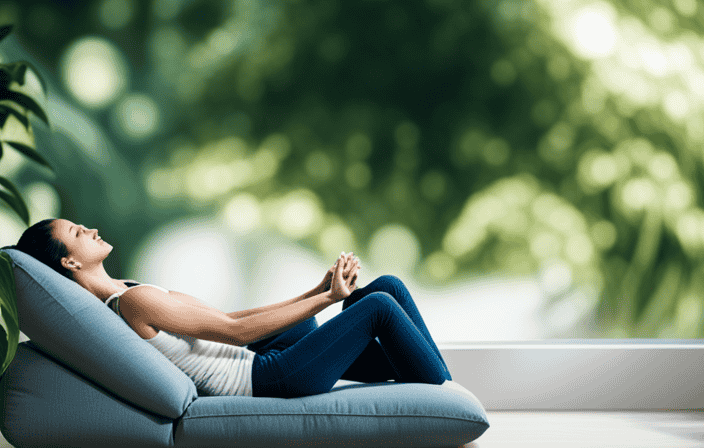Have you ever experienced feeling like a well-oiled machine, smoothly transitioning from being awake to falling asleep and vice versa? Picture your sleep-wake schedule as the conductor of this symphony, ensuring a seamless balance between rest and productivity.
Mastering sleep-wake routines and managing light exposure are the keys to achieving restful nights. By maintaining a consistent sleep-wake cycle, optimizing morning light exposure, and managing light exposure throughout the day, you can unlock the secrets to better sleep.
In this article, we will explore evidence-based strategies to help you master sleep-wake routines and light for truly restful nights.
Key Takeaways
- Consistency in sleep-wake cycle improves sleep quality
- Get sunlight in the morning and spend time outdoors during the day
- Avoid bright screens and late-night TV before bedtime
- Create a dark and comfortable sleeping environment
Light and Sleep-Wake Cycles
I need to be mindful of the impact of light on my sleep-wake cycles and make sure to manage my light exposure in order to consistently get a good night of sleep.
Consistency in my sleep-wake cycle is key, so I should aim to go to bed and wake up at the same time every day.
In the morning, I should get sunlight, either by spending time outdoors or by allowing natural light into my home and workspace. If sunlight is limited, I can use a light therapy box to simulate sunlight.
I should also avoid bright screens, such as tablets and TVs, 1-2 hours before bedtime, as they can disrupt the production of melatonin, a hormone that regulates sleep.
By being mindful of light exposure and following these strategies, I can improve the quality of my sleep and wake up feeling refreshed.
Consistency in Sleep-Wake Cycle
Maintaining a consistent schedule for going to bed and waking up each day can greatly improve the quality of sleep. When we have a consistent sleep-wake cycle, our body becomes accustomed to a regular rhythm, making it easier to fall asleep and wake up feeling refreshed. This consistency helps regulate our internal clock, also known as the circadian rhythm, which controls our sleep-wake cycle.
To illustrate the benefits of consistency in our sleep-wake cycle, let’s consider the following table:
| Consistent Sleep-Wake Cycle | Benefits |
|---|---|
| Helps regulate circadian rhythm | Promotes better sleep quality |
| Makes it easier to fall asleep and wake up | Increases daytime alertness |
| Improves overall sleep duration | Enhances cognitive function |
| Reduces the risk of sleep disorders | Boosts mood and well-being |
By following a consistent sleep schedule, we can optimize our sleep-wake cycle and reap the benefits of a well-rested body and mind. So, let’s prioritize a regular bedtime and wake-up time to achieve restful nights and energized days.
Morning Light Exposure
Morning light exposure is important for several reasons. First, it boosts mood and energy levels. Natural light in the morning helps regulate our circadian rhythm, making us feel more awake and alert throughout the day. It can improve our mood and increase our energy levels, setting the tone for a productive day ahead.
Second, morning light exposure enhances alertness and focus. Sunlight in the morning can enhance cognitive function, including attention and alertness. This can help us stay focused and perform better in our daily tasks, whether it’s at work or school.
Lastly, morning light exposure supports healthy sleep patterns. It helps reset our internal body clock, making it easier to fall asleep at night and wake up in the morning. It can improve the quality and duration of our sleep, leading to a more restful night.
To maximize the benefits of morning light exposure, try to spend time outdoors, have breakfast by a sunny window, or use a light therapy box if natural sunlight is limited.
Managing Light Exposure
One effective strategy for managing light exposure is to limit the use of bright screens before bedtime. Bright screens, such as those on televisions, smartphones, and tablets, emit blue light that can disrupt our sleep-wake cycle by suppressing the production of melatonin, a hormone that helps regulate sleep.
Research has shown that exposure to bright screens before bedtime can delay the onset of sleep and reduce the overall quality of our sleep. To promote restful nights, it is recommended to avoid using bright screens at least one to two hours before bedtime.
Instead, consider engaging in relaxing activities such as reading a book, listening to calming music, or practicing relaxation techniques. Creating a dark and comfortable sleeping environment by using heavy curtains or a sleep mask can also help block out any unwanted light and optimize our sleep quality.
Importance of Breakfast
To start my day off right, I always make sure to have a healthy breakfast. Skipping breakfast can disrupt blood sugar rhythms and energy levels, ultimately impacting sleep quality. Studies have shown that not eating breakfast increases stress levels, making it harder to fall asleep and stay asleep throughout the night.
By starting the morning with a nutritious breakfast, I am able to maintain a consistent sleep-wake rhythm and support my overall well-being.
Additionally, it is important to avoid after-dinner drowsiness by staying active and avoiding bright screens before bedtime. Using smaller screens and light-altering software can help reduce the disruption of melatonin production, ensuring a better night’s sleep.
Creating a dark and comfortable sleeping environment is also crucial for restful nights.
Impact of Blue Light
During the day, I make sure to limit my exposure to bright screens and use smaller screens and light-altering software to reduce the impact of blue light on my sleep.
Blue light emitted by screens can disrupt our sleep-wake cycle and suppress melatonin production, making it harder to fall asleep and stay asleep.
By using smaller screens and light-altering software, such as night mode or blue light filters, I can minimize the amount of blue light that reaches my eyes in the evening. This allows my body to naturally produce melatonin and prepare for restful sleep.
Additionally, I avoid late-night TV and backlit tablets, as they can further disrupt melatonin production.
Creating a dark and comfortable sleeping environment, free from electronic devices emitting light, also helps promote better sleep.
Managing Sleep Disruptions
At night, I ensure that I cover any electronics emitting light in my bedroom to minimize sleep disruptions. I understand that exposure to light, especially from screens, can interfere with the production of melatonin, a hormone that helps regulate sleep-wake cycles.
By covering these devices, I create a dark and comfortable sleeping environment, which promotes better sleep. Additionally, I use a dimming nightlight for middle-of-the-night awakenings to avoid excessive exposure to bright light.
I have also learned the importance of maintaining a consistent sleep-wake schedule to promote a healthy circadian rhythm. If I am having trouble falling asleep at night, I avoid napping during the day and limit daytime naps to 15-20 minutes.
These strategies have helped me manage sleep disruptions and improve the quality of my sleep.
Importance of Natural Light
I enjoy spending time outdoors during the day to benefit from natural light and regulate my circadian rhythm. Natural light plays a crucial role in our sleep-wake cycle, making us feel more awake and alert. It helps to synchronize our internal body clock, ensuring that we feel sleepy at night and awake during the day.
By getting sunlight exposure during the day, I am able to boost my energy levels and improve my overall sleep quality. Moving my workspace closer to the window also allows me to receive more natural light throughout the day.
Additionally, using a light therapy box can be helpful during times when sunlight is limited. By incorporating these strategies, I can maintain a consistent sleep-wake schedule and promote better sleep.
Melatonin and Sleep Regulation
By regulating my exposure to light and maintaining a consistent sleep-wake cycle, I can ensure that my body produces the necessary amount of melatonin to promote quality sleep. Melatonin is a hormone that helps regulate our sleep-wake cycle, also known as our circadian rhythm. It is produced by the pineal gland in the brain and is influenced by light exposure. When it gets dark, our body releases more melatonin, making us feel sleepy. However, exposure to bright lights, especially blue light emitted by electronic devices, can suppress melatonin production and disrupt our sleep. To optimize melatonin production, it is important to limit exposure to bright lights before bedtime and ensure a dark and comfortable sleeping environment. Additionally, getting sunlight during the day can also help regulate our melatonin levels and promote better sleep.
Strategies for Better Sleep
To optimize my sleep, I can implement various strategies that promote a consistent sleep-wake cycle and ensure a comfortable sleeping environment.
One important strategy is to maintain a consistent sleep-wake schedule, going to bed and waking up at the same time every day. This helps regulate my body’s internal clock and improves the quality of my sleep.
I should also limit my exposure to light before bedtime, as bright screens and TVs can disrupt the production of melatonin, a hormone that regulates sleep. Instead, I can use light-altering software and listen to soothing music to wind down before bed.
Creating a dark and comfortable sleeping environment, such as using heavy curtains or a sleep mask, can also contribute to better sleep.
By implementing these strategies, I can improve my sleep and wake up feeling more refreshed and energized.
Creating a Sleep-Friendly Environment
Now that we have discussed strategies for better sleep, let’s talk about creating a sleep-friendly environment. Having the right environment can greatly improve your quality of sleep. Here are a few tips to help you create a conducive sleep environment:
- Keep your bedroom dark: Use heavy curtains or a sleep mask to block out any light that may enter your room.
- Keep the room cool: Maintain a cool temperature in your bedroom, as a cooler room promotes better sleep.
- Minimize noise: Use earplugs or a white noise machine to drown out any noise that may disturb your sleep.
- Invest in a comfortable mattress and pillows: Having a comfortable sleeping surface is essential for a good night’s sleep.
- Declutter your bedroom: Keep your bedroom clean and organized to create a calming and relaxing atmosphere.
By implementing these tips, you can create a sleep-friendly environment that will support restful nights.
Frequently Asked Questions
How does exposure to bright screens before bedtime affect melatonin production?
Exposure to bright screens before bedtime can disrupt melatonin production. The blue light emitted by screens suppresses melatonin, a hormone that regulates sleep-wake cycles. This can make it harder to fall asleep and negatively impact the quality of sleep.
Can using a light therapy box in the morning help regulate sleep-wake cycles?
Using a light therapy box in the morning can help regulate sleep-wake cycles. It’s like getting a dose of sunshine to kickstart your body’s natural rhythm. I’ve personally found it effective in improving my sleep quality.
Is it better to have breakfast in natural light or artificial light?
It is better to have breakfast in natural light rather than artificial light. Natural light helps regulate circadian rhythm and promotes wakefulness, while artificial light can disrupt sleep-wake cycles and melatonin production.
How does consistent sleep-wake schedule affect overall sleep quality?
Consistently following a sleep-wake schedule positively impacts overall sleep quality. Going to bed and waking up at the same time each day helps regulate the body’s internal clock, promoting better sleep and wakefulness.
Does listening to music instead of watching TV before bedtime have any impact on melatonin levels?
Listening to music instead of watching TV before bedtime can have a positive impact on melatonin levels. Bright screens and TVs disrupt melatonin production, while music promotes relaxation, aiding in a better night’s sleep.









